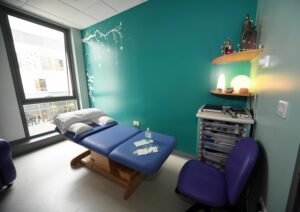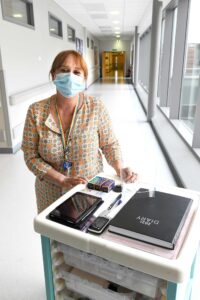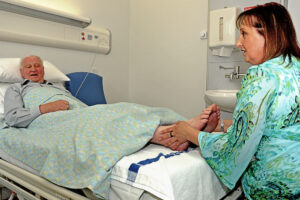COMPLEMENTARY THERAPY PROVIDES VITAL SUPPORT FOR CANCER PATIENTS AND NHS STAFF
A patient support service we fund is proving more important than ever in the face of increased anxieties faced by many people during the pandemic.
Cancer treatment can be physically and emotionally challenging, so patients receiving cancer care at Newcastle Hospitals are additionally supported by a Complementary Therapy Service that provides help to relieve issues including anxiety, pain and lack of sleep.
The service is delivered free of charge to patients at the Northern Centre for Cancer Care who come to Newcastle for specialist cancer treatment from across the North East, Cumbria and further afield.
It has been supporting patients since 2004 and is currently funded by our Foundation and Charlie Bear for Cancer Care, both part of Newcastle Hospitals Charity.
Sir Bobby found complementary therapy very beneficial during his cancer treatment in Newcastle and our Foundation has provided funding for it since 2008.
Over the last 16 years, more than 24,000 patients have received treatments including reflexology, massage, gentle touch therapy, mindfulness and supportive listening.
The service is delivered on wards, in the Sir Bobby Robson Cancer Trials Research Centre and also within a specialist Complementary Therapy Suite, which was also funded by our Foundation and Charlie Bear for Cancer Care.
This dedicated treatment room was the brainchild of lead complementary therapist, Angela Jackson, and provides a space to allow patients to ‘escape’ the normal clinical environment of the hospital. It was officially opened by Newcastle United’s Shola Ameobi in 2018.
 Angela and her small team have worked tirelessly to continue delivering complementary therapy during the Covid-19 pandemic, a time when many cancer patients have felt increased anxiety.
Angela and her small team have worked tirelessly to continue delivering complementary therapy during the Covid-19 pandemic, a time when many cancer patients have felt increased anxiety.
In addition, recognising the pressure her NHS colleagues have also been under, she came up with a way to offer them rest and respite within the hospital during these challenging times.
Angela explains: “During the pandemic, we’ve had to adapt the ways in which we provide treatments. We wear full personal protective equipment (PPE) and currently only work on wards, because we’re not able to offer treatment within the confines of the therapy suite.
“It’s been hard at times wearing PPE, especially as we usually try to make the service as far away from a clinical experience as possible, but I’m so proud to have been able to be there for the many patients who request our support. We’re honoured to have been able to listen and provide comfort to patients, especially when restrictions for visitors meant their families weren’t able to be there in person.
“I also realised there were a few ways in which we could provide support to our colleagues on the frontline, who have also had to adapt to lots of changes at home and work.
“I started talking to staff about mindfulness and relaxation techniques and then I thought about the empty therapy suite and realised we had this wonderful space of relaxation available.
“As we weren’t able to use it for patient treatments, I decided to modify it to become a space of respite and reflection for staff who might like to take some time out to reflect as they experienced these uncertain times.
 “Every day, we’ve been opening our doors and setting up as we would normally do for patients. We play some gentle music, light LED candles and offer the space to any member of staff who felt they would like to use the room for some quiet reflection. It’s been very greatly appreciated and we’re very glad it’s being used.”
“Every day, we’ve been opening our doors and setting up as we would normally do for patients. We play some gentle music, light LED candles and offer the space to any member of staff who felt they would like to use the room for some quiet reflection. It’s been very greatly appreciated and we’re very glad it’s being used.”
Whilst adapting to meet Government guidelines for the industry during the pandemic, including regular risk assessments to ensure safe working practices for both patients and staff, Angela and her team successfully treated more than 1,370 patients during 2020.
Each therapy is intended to complement a patient’s medical care alongside their cancer treatment and it is particularly valued by people who are feeling anxious ahead of radiotherapy and chemotherapy treatments.
Angela adds: “In this role, every day is different and we’re always adapting to meet the needs of patients so we can support them as best we can.
“I’m so pleased we’ve been able to continue to provide our service during the pandemic and hope we’ve also been able to offer comfort and support to our colleagues in these difficult times, too.”





